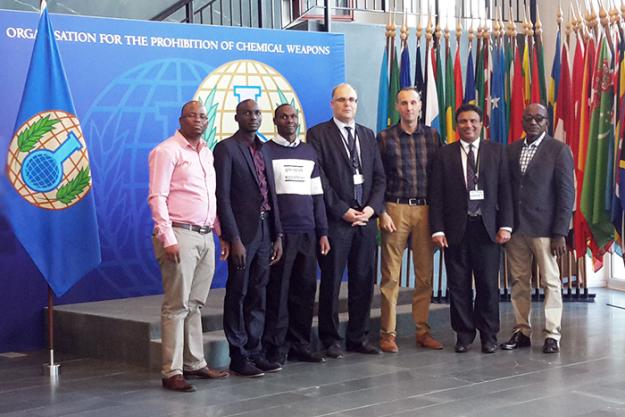
Participants at Basic Proficiency Test Training
THE HAGUE, Netherlands — 5 November 2018 — The Organisation for the Prohibition of Chemical Weapons (OPCW) held its first-ever basic proficiency test training for its Member States from Africa, at the OPCW Laboratory in Rijswijk, from 29 October – 2 November.
The OPCW Director of the International Cooperation and Assistance Division, Mr Hamza Khelif, underlined in his remarks that, “the OPCW attaches great importance to building the analytical chemistry capacity among its African Member States, which serves the wider goal of promoting peaceful uses of chemistry”. He further expressed hope that the course will facilitate the designation of African laboratories to the list of the OPCW designated laboratories.
The training’s five participants – representing Algeria, Botswana, Kenya, Nigeria and Uganda – learned about the key provisions of the Chemical Weapons Convention, and the OPCW’s mission and activities, with special focus on verification.
The practical segment included training in Gas Chromatography (GC) and Gas Chromatography-Mass Spectrometry (GCMS) for the analysis of chemicals relevant to the Convention. Sample preparation and the application of the OPCW Central Analytical Database (OCAD) in compound identification were also covered.
The course, part of the OPCW Programme to Strengthen Cooperation with Africa, will be continued in 2019.
Background
OPCW designated laboratories analyse samples collected during OPCW inspection activities. To receive the designation, labs must pass the stringent OPCW proficiency testing programme. Currently, there are no OPCW designated labs on the African continent.
The OPCW Chemical Safety and Security Programme was launched in 2009 and has since become a leading forum for the exchange and development of expertise in chemical management.
The Programme to Strengthen Cooperation with Africa on the Chemical Weapons Convention focuses on activities and interventions that meet the particular needs of African Member States. One of its objectives is to support African States Parties to strengthen integrated chemicals management, including chemical safety, security and sustainability.
As the implementing body for the Chemical Weapons Convention, the OPCW, with its 193 Member States, oversees the global endeavour to permanently eliminate chemical weapons. Since the Convention’s entry into force in 1997, it is the most successful disarmament treaty eliminating an entire class of weapons of mass destruction.
Over 96% of all chemical weapon stockpiles declared by possessor States have been destroyed under OPCW verification. For its extensive efforts in eliminating chemical weapons, the OPCW received the 2013 Nobel Peace Prize.
